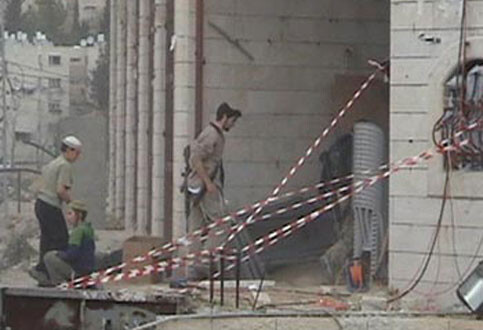B'Tselem 28 March 2007

The new Jewish settlement in Hebron. (B’Tselem)
On 19 March 2007, a new settlement was established in the heart of a Palestinian neighborhood in Hebron . According to media reports, the settlement is composed mainly of Israeli yeshiva students. The Israeli army has redeployed in the city to protect the settlement. The Defense Ministry initially hinted that it was considering evacuating the settlement, but as time passes, it becomes clear that the political echelon has decided to leave the settlement in place.
Harm to Palestinian residents
Since the massacre by settler Baruch Goldstein in the Tomb of the Patriarchs, in 1994, the Israeli army has employed a policy to protect the settlers based on a “principle of separation.” This policy is employed openly and officially, although reliance on this principle of separation is illegitimate. The primary feature of this policy is severe restrictions on Palestinian movement in the center of the city, where most of the settlements have been established. Some of the main streets in this area are completely off-limits Palestinians, and many are closed to Palestinian vehicles. The draconian restrictions have made Palestinian life in Hebron ‘s city center intolerable and have forced a large number of Palestinians to move from their homes and places of work.
Establishment of the new settlement in the heart of a Palestinian community will lead to further restrictions on Palestinian movement. There is a grave concern that the army will prevent reasonable Palestinian movement in the neighborhood and force most of the residents to leave, repeating the phenomenon that occurred in the area around the city’s “veteran” settlements. If the army imposes restrictions on the neighborhood and on the streets leading to it, Palestinian movement would be forbidden in the entire area from the Kiryat Arba settlement, in the east, to the Tel Rumeida neighborhood in the west. This series of restrictions would not only cause hardship for local residents, but will harm residents of the entire area, who would have to travel all the way around the city center to get from one place to another. This area has traditionally been the commercial center of Hebron and of the entire southwestern part of the West Bank , so restrictions on travel will cause much economic damage as well as impede access to health services, schools, and religious institutions.
In addition, establishment of the settlement will expose many more Palestinians to settler violence, which has become a daily occurrence in Hebron . Past experience demonstrates that the army and the police do not enforce the law on settlers who commit acts of violence. On more than one occasion, B’Tselem has documented soldiers standing idly by while settlers assault Palestinians and damage their property in the heart of the city. There is no reason to assume that Israeli security forces will act differently in the case of the new settlement.
Familiarity with Israel’s policies regarding settlements and settlers in Hebron indicates that this new settlement will result in a series of extremely severe violations of Palestinian human rights: the right to freedom of movement, the right to property, the right to earn a livelihood, the right to an adequate standard of living, including the right to adequate housing, the right to the highest possible standard of health, the right to education, the right to family life, and the right to privacy.
Israel ‘s obligation to evacuate the settlement
Establishment of settlements is explicitly prohibited by international humanitarian law. This prohibition is intended to eliminate colonialism. In light of the illegality of the settlements in the heart of Hebron, and the grave infringement of human rights that come in their wake, Israel must remove the settlers living there - both in the new settlement and in all the settlements in the city - and return them to sovereign Israeli territory. This obligation is not affected by the question of the legal ownership of the properties housing the settlements.
Related Links